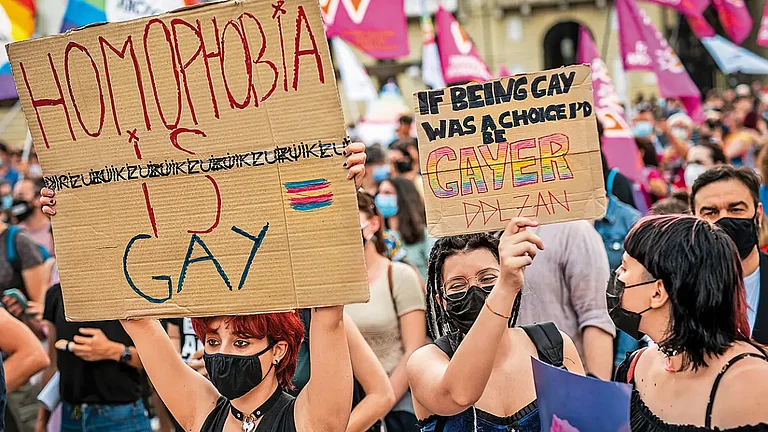If an LGBT+ person has been living with their chosen family, does that family have the right to make medical decisions for them in the event of an emergency? This is the question that a Delhi High Court bench comprising Justice Sachin Datta must decide.
Arshiya Takkar, a queer individual, has approached DHC requesting it issue directions to the Centre to frame guidelines that would allow same-sex couples to have the same rights as heterosexual couples in the event of a medical emergency.
“The central issue of this petition is the absence of a clear legal framework or common law recognition for "partners in a union" to be acknowledged for medical consent during medical treatment/emergencies,” said Takkar’s petition filed by senior advocate Saurabh Kirpal.
Takkar has said that the lack of clear legal directives on the issue of queer people’s emergency contacts has left same-sex couples helpless when faced with medical decisions that are critical for their partners.
“The existing regulation in vogue i.e., Clause 7.16 of the Indian Medical Council (Professional Conduct, Etiquette and Ethics) Regulations, 2002 [2002 Regulations] mandate consent
for medical procedures/treatment from a "husband or wife, parent or guardian in the case of minor, or the patient himself",” pointed out Takkar’s petition, adding that “this lack of explicit recognition of partners in a union renders the Petitioner effectively powerless to make critical medical decisions” for their partner, which was a right that had been “readily available to heterosexual partners/couples under the prevailing 2002 Regulations.”
The court issued notice on the petition and has asked the Centre to respond within a month.
During the hearing, Monika Arora, Delhi High Court’s Standing Counsel, said that such directions could not be issued as same-sex couples could not get legally married under Indian law. She argued that the 2002 regulations were at parity for both same-sex couples and heterosexual couples as they also restrained straight people from granting consent or making decisions in medical emergencies if the two people weren’t married.
“Same sex marriage is not recognised in India. Whatever is available to everyone who is not married, is available to them (same sex couple),” Arora said.
However, the court was of a different view and pointed out that the regulations had not envisioned all situations possible. “Take a situation where one is living all by themselves or even (unmarried) heterosexual partners... I don’t see any reason as to why this regime should not be available (to unmarried couples or queer couples),” said Justice Datta.
While arguing Takkar’s petition, Kirpal said that the 2002 regulations were effectively denying same-sex couples the basic rights that it allowed straight couples, thus making the regulations discriminatory and against the Supreme Court’s judgements in NALSAR and Supriyo.
“The 2002 Regulations by restricting medical decisions making rights to heterosexual couples or to normative family members, perpetuates a restrictive framework that fails to recognise the dignity and autonomy of LGBTQIA+ or queer couples, as valid familial units, which is inconsistent with the constitutional protections,” said the petition.
The senior advocate pointed out that even though the SC had refused to interfere in what it said was a legislative prerogative to create laws for same-sex marriage, the apex court had still recognised LGBT+ folks fundamental rights, including the rights to a relationship and the right to not be discriminated against.
“The concept of "chosen families" for LGBTQIA+ individuals has been explicitly recognised and emphasized by the Hon’ble Supreme Court of India,” the petition said.
The Centre had thus failed to adhere the SC’s directions to take expeditious measure to address the discriminatory impacts of such exclusions.
The senior lawyer also argued that the use of only husband, wife or parents in such medical emergencies were arbitrary and unreasonable
On October 17, 2023, the Supreme Court by a 3-2 majority, declined to grant same-sex couples legal recognition for marriages or civil unions, stating that the issue fell within the legislative domain.
The majority opinion, penned by justices Bhat, Kohli and Narasimha, held that extending the right to marry or enter civil unions to queer couples was not a constitutionally protected mandate.
However, the dissenting opinions of CJI Chandrachud and justice Kaul emphasised the constitutional rights of queer individuals to form unions and adopt children, bemoaning the exclusion of non-heterosexual couples from existing legal frameworks.
The judges ruled that the State is under an obligation to recognise such unions and grant them a bouquet of benefits.
Following the Supreme Court’s ruling, the union finance ministry last year had clarified that queer individuals can open joint bank accounts, nominate queer partners as nominees to receive the balance in their account in the event of the partner’s death.
















